Queen of Dragons d-3 Read online
Page 4
Silence took the room; the patter of the rain grew louder and then softer. From somewhere deep inside the labyrinth of the manor, someone started to cough.
"Sorry." Kim closed his eyes and rubbed his forehead with stiff fingers. "I think perhaps I'm delirious with hunger."
His brother's response was carefully light. "It would be pleasant to dine on something larger than my thumb."
Kimber dropped his hand. "Let's try the kitchens. I'd gnaw on boiled leather at this point to get the taste of sugar out of my mouth."
He waited until nightfall to fly. It was difficult, because the need to shed his skin had become a persistent itch, growing stronger and stronger as the day wound on. They could Turn at any time, of course, but they were supposed to wait for dark. The night was their best domain, full of secrets and shadows that tricked the human eye.
Darkfrith was deceptively ordinary by day. By night, her skies glistened with scales.
Tonight was especially ideal; the clouds were still low and heavy like tufts of wet fleece, easy to pierce. It would be just like shooting an arrow through a blanket.
From the balcony of his unlit quarters, Kimber watched the skies. He watched as the men of his tribe dissolved, one by one, into gusts of smoke that drifted upward from houses and farm-steads, up to that billowing mass, churning and fading. He felt them Turning again above the haze, becoming more than smoke. He cocked his head, and he could hear the very air above the earth sliced into rivers by wings and tails.
His blood began to pulse in harmony. His heart in his chest began to hammer, a gilded beast poised to break free.
He removed his garments. He stepped forward, closing his eyes in appreciation, expanding his lungs until they hurt. The rain perfumed him, it cleansed him, sent anticipation along his bare body in slick beaded welcome.
He opened his eyes and at last became smoke.
The first time he'd Turned, pain had flamed through his being like the molten core of the sun. The initial Turn was always the most treacherous—too many young drakon perished in that first instant of disintegration—but the subsequent joy of breaking free of his human form had been akin to nothing he had ever known. And after all these years, there was nothing still to compare to it: not food or drink, not power or money, not women. Nothing.
He let the rain pour through him, effortless. He willed himself to rise and he did, another plume of gray, another drifting coil, until he grazed the edge of the clouds, learning their cold sapphire weight, pushing through, merging.
He did not wait to Turn again. Kimber became a dragon right there, still cloaked in rainclouds, and did a spinning loop that swirled the mists. He stretched his neck and his wings and charged higher, breaking free all at once, an arrow indeed of scarlet and blue, and talons of bright hard gold.
His tribe was about, hunting and diving. Sinuous, lustrous as polished steel, the other dragons instinctively swerved away, letting him soar where he wished.
The moon was an ivory pearl encircled with stars, ever tempting. The land below the clouds was soft and living, and his.
His people, his home; every aspect, every atom of the air, every heart that beat.
He could not imagine wanting to leave. He could not imagine a more perfect place.
Kim bared his teeth and pumped his wings to climb higher, until his memories of the day had blown clear, until there was nothing of him left but the harsh, animal ache of straining muscle and breath.
The second body was found in a mine. A mine that the princess—and every other dragon of the mountains—knew well, in fact. It hadn't been dragged very far inside, but the winter had been long and even more frigid than usual. It had snowed nearly every week from November into February, and the winds had pushed great mounds of leaves and powder into every cranny of the world. By May, the snows were beginning to let loose their grasp to rain, and a peasant boy, a sheepherder, had ventured into the tunnel entrance by chance to escape the hammering downpour.
Once it had been a great and prosperous mine, as all the mines stabbed through the Carpathians were. Once, it had yielded cart-loads of ore riddled with copper, and dragon-men and human men had worked together to empty it of its wealth. But that was centuries ago. On this day it offered only one fresh discovery to the drenched shepherd: the remains of a man with a hole in his chest, and fair hair that had frozen into icicles, slowly thawing beneath a blanket of snow.
And a ring made of gold. A signet ring.
The news reached the castle that afternoon. By four o'clock Sandu had tracked Maricara not to the mine—he wasn't surprised she wouldn't go there—but to the high and bleak peaks of the most remote of the mountains, higher than any of the Others would go. Higher than trees, higher than hamlets or monasteries, higher even than Zaharen Yce.
She stood alone with her feet planted in the snow, her arms folded over her chest, gazing out at the cloudy tors of stone and ice that stretched as far as he could see. He knew she sensed him, although she really didn't move. Only her eyes cut to him, that pale and penetrating stare finding the curve of smoke he took to funnel down to her side.
She did not stir as he coalesced. He became human with his back to hers, not touching. Neither of them turned around.
It was damned cold up here, and blustery. She was always doing outlandish things like this, going off to stand naked in the snow atop a mountain. Sometimes he wondered if she did it just to test him, to see how far he truly would push to follow her.
"The situation is poor," Alexandru said.
"Yes. I imagine so."
"No, Mari, I mean poor. The worst I've ever seen. The Others are frightened, and they're angry. They're no longer complaining about their sheep or pigs. They're hiding their children. Great God, Maricara. Even the serfs have heard whispers of what's been happening in France."
Her hair whipped his back with the wind, a brown so deep it was nearly black; loosened grains of snow whipped with it, embedding in his skin.
"I don't know what to do," Sandu confessed, hearing the frustration in his voice. "Tell me, Princess. What should I do?"
She was silent a long while, and just when he was beginning to suspect she wouldn't answer him at all, she did.
"You must go back to them and tell them the truth. Tell them that men have decided to hunt us again. They should take all precautions."
"Men?" he echoed, and in his astonishment turned his head to see her. "What are you talking about?"
She glanced back at him, sober, her cheeks pink with cold. "I didn't kill anyone—at least not those two. They were drakon, and English. If they'd wished to, they might have killed me in a fight. No doubt they would have been bigger and stronger. But they died in human form, which means they were taken by surprise. There were no claw marks on the body, just that one wound to the chest."
"You saw the new body?"
"I did." His lips pressed tight, and she sighed, looking away. "This afternoon, first thing. I flew there as soon as I heard."
"Oh."
Sandu faced away too, his eyes tearing. His feet were numb to the ankles. He crossed his arms and clenched his fingers into his elbows to control the shivers, but Maricara only stood there like a rock, like a statue, unmoving. Her hair curved around him once more, a cloak of dark wind.
"I don't think they'll believe me," he said softly, and blinked to rid the salt from his vision. "I don't know. I don't know."
"Then they are going to die," she answered. "The proof will come to you soon enough. I'm leaving. If the killings continue, you'll know it wasn't me."
Deep in his heart, Sandu had braced for this moment. He might have even been searching for her to tell her so himself. But it was a relief that she said it aloud instead of him. He felt lighter at once, guilty and thankful in a rush of warm confusion. The snow, the jagged peaks, the relentless blue and white of his world all came together, all crystallized into a new and clarifying sense. She was leaving, and all would be right again.
When the air cleared fr
om his exhalation, he spoke to the ice on the ground.
"Where will you go?"
She reached up to tuck her hair behind one ear, a girlish gesture, one that made her seem both younger and more ordinary than she really was.
"To the west, I think," Maricara said. "I have a message to deliver."
"Mari—"
"You'll do fine. Keep your head up. Keep your eyes open. You're the prince now, and the people will want you to be ruthless. Never forget it."
How could he? Because of her, the gilded wires of Alpha caged every second of his life.
CHAPTER THREE
It is no small task of will to veil ourselves from Others. Temptation tantalizes from all around—the tang of delicious sky upon our tongues; the fierce, burning stretch of our wingbones as we clasp a channel of wind. The pleasure of rolling through clouds, or of becoming one; of stealing into locked inns and cafes in thin, smoky tendrils, to do as we like.
Food tastes better as dragons. Colors that appear to you as dark and bland are as vibrant as the sunrise to our eyes. Scents can overwhelm us; from miles away we can smell mice or apple blossoms or that small teardrop of fear that winks from your eye as you gaze up at us lancing the heavens.
Cold, heat, water, wind: Everything slides off our scales.
We are more beautiful than you, and infinitely clever. We can glide so high above your common little towns, you'll convince yourself we're just the expression of your wildest imagination. Too much ale. Too little sleep.
So if a drakon of such extraordinary Gifts was forced to travel, would she choose the ordinary human way, with horses, and reeking carriages, and ships that crawled at a slug's pace across the open seas?
Or would she merely open her wings and fly? You know what you would do, if only you could.
CHAPTER FOUR
Years later, when his life had resolved once again into reasoned lucidity, Kimber would remember the night that his sensible and fortified existence shattered with one particular, acute sensation: sweat.
It was hot in Darkfrith, the hottest June anyone could recall. Summer had come early in a wave of heat that shimmered across the land, that dried the tender tips of anemones and meadow grasses, and burned the sky into a deep, humid cobalt. The fresh green shoots of wheat and rye slowed their spectacular growth; the many streams that fed into the River Fier grew sluggish and shallow. Only the forest remained unaffected, dense and fragrant with wildflowers and bracken, elm and oak and birch.
The village elders convened for gossip over whist and lukewarm lemonade, wearing muslin and lace in shadowed parlors with the casements opened wide.
The young retreated into the woods.
At night those who could would still take to the air, finding relief in the thinnest upper curve of the atmosphere; there were no clouds to hide behind. Even the moon seemed to withdraw, her light wan and blued. Excepting the new mosquitoes darting above the ponds, nothing flourished.
That afternoon a letter had arrived from the marquess and marchioness. It was postmarked from Flanders, addressed to Kimber, and consisted of just two lines:
Others come. Guard the shire.
Kim pondered that, sprawled atop the duvet of his ebony bed, as he followed the moonlight creeping along the ceiling, and then gradually down the walls. He'd left the balcony doors open to the garden of flowers and gravel pathways two stories below, but the only aroma that lifted was of wilted petals and baked stone; there was no breeze. It was too hot for coverings, too hot for riddles. He'd already crossed the shire and back, had set his guards in constant flight at the perimeters, and still had no idea what his parents might have actually meant.
Others come? Would it have been too bloody much trouble for them to be more specific? It was unlike them to be so cryptic—well, unlike his father, at least. Kimber rolled to his side and pushed away his pillows, irritated. Except for the initials scrawled across the bottom of the page, there wasn't even a hint of who had sent it.
He fell asleep as the moonlight shortened into a slit along the raw silk curtains, dreaming of fire and boiling water, of the sun reflecting off the sea.
And when he woke a few hours later, something had changed.
The air felt different, charged somehow, a heaviness eating down through his bones, crackling the hair on his arms and legs. He lay very still a moment, breathing slowly, the sheets at his waist, smelling and tasting and measuring that subtle, smoking sting like gunpowder lingering at the back of his throat.
The doors were still open, the night was still sweltering, but that wasn't it.
Someone was here in the mansion. Someone new, someone with power. Someone he had never felt before.
A drakon.
He rose, folding back the sheets, his toes pressing the warm maple floor. He wouldn't Turn—too obvious—but he could hunt without Turning. In the quiet, in the heat, in storm or total blindness, Kimber knew he could hunt.
In his drawers and bare feet, his hair a heated weight down his neck, he padded to the door of his chamber, pushed it ajar. A breath of more temperate air washed along the length of his body, cooling the moisture on his skin. The beast within him stretched into sinew and blood, eager to surface.
Downstairs, it whispered.
Chasen Manor had been built with an eye for grace and updated for luxury, another cunning ruse in his family's presentation of itself to the world. The main hallway of the upper level yawned wide and open, floored with checkered stone tiles; skylights of clean, polished glass illumed the corridor and allowed in the night. Kim avoided the brighter patches. He stole through shadows to the grand staircase, pausing to listen, but heard nothing beyond the usual background of distant snores, and the creaks and groans of timber beams cooling with the dark.
But he was not mistaken. Despite his guards, despite his vigilance, Chasen had been breached.
Yes, murmured the dragon, flexing, growing. Danger. Destroy it.
He moved utterly without noise. His foot found the first step down the white marble stairs, and then the next. He reached the base swiftly and fell again into shadow.
The scent, the rippling of fresh power, was coming from the music room.
He wondered briefly where Rhys was, why he hadn't sensed the threat as well, but there was no time to wake him. The stinging charge was nearly electric at this point, the friction of thunder-heads against ether, remarkably strong. He approached the open doors and, his back to the wood, glanced in.
Faint moonlight still rinsed through these windows, tracing black and blue and charcoal across the furnishings. Frozen elegance, the drapes and rug and cream agate mantel framing the hearth, the pianoforte—the chamber appeared empty. The fire was feathered ash; there weren't even any dust motes to settle with a draft. The only sound to be heard was the bracket clock ticking, very loudly, atop the cabinet in the corner, its grinning cherubs just visible in a gleam of dull metallic blue.
The air was oppressive. The heat, the living friction, the sting against his skin. He was burning inside, expanding: The dragon writhed to be free, to taste blood.
Kimber stood motionless. He waited.
And in the blackest of the corners he saw at last the something he had sensed, a slight, languorous movement that seemed almost joined with the night, just as sultry and silky slow. It resolved to become a shoulder, a bare pale arm. The curve of a neck and cheekbones and lips; a wash of moonlit hair; dark-lashed, amazing clear eyes—eyes like water, like the light—watching him without blinking.
A woman.
And now the dragon became an exhalation, hissed hard between his teeth. Great God, what the hell—
"I know who you are," said the woman in French. Her voice was soft, melodious; it sent fresh shivers across his skin. She hesitated, then walked closer. Against the rigidly polished lines of the pianoforte, he realized she wore no clothing at all. "Do you know me, Lord Kimber of Chasen?"
He took an involuntary step forward. A thousand stories raced through his mind, explanations
, excuses. There could be only one answer here, only one female in the world who could steal into his home undetected—
She lifted one hand, her fist closed. Without looking away from him, her fingers opened, and she inverted her palm. Twin flashes of metal fell to the rug, bounced against the woven flowers with a muffled tattoo before rolling flat.
She'd dropped rings, a pair of them. Signet rings.
Tribal rings. Exactly like the ones worn by Jeffrey and Luke and Hayden.
Kim raked his eyes back to hers.
"I've brought you a gift, as you can see." The Princess Maricara gave a small, chilly smile. "But perhaps we might make this an exchange instead. Is there something you wish to tell me?"
Mari's experience with Others was limited. She knew the peasants of her land—knew them well, in fact, as she had once been among them, although the manifestation of her dragon Gifts had set her undeniably apart.
She knew the visiting clerics who would on occasion attempt to ascend her mountain and preach to her people; after a few weeks of the feral alpine nights these men would nearly always retreat back into their safely walled chapels.
And she knew Zane, the thief, the husband of the drakon Lady Amalia.
She had not known him well, granted. Nearly all of their time together had been spent with Lia there too, the pair of them thick with secret looks and a language Mari hadn't mastered. But she had liked Lia well enough and was disposed to like Zane, who—for an Other—was handsome and quick-witted, and had eyes of golden amber.
It was possible that Mari had developed the very slightest infatuation for Zane during his months of stay at her castle.

 The Second Mrs. Astor
The Second Mrs. Astor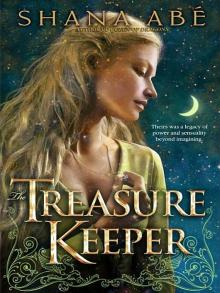 The Treasure Keeper
The Treasure Keeper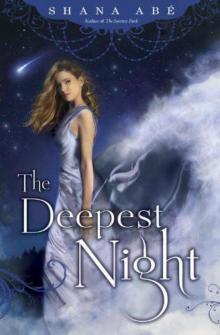 The Deepest Night
The Deepest Night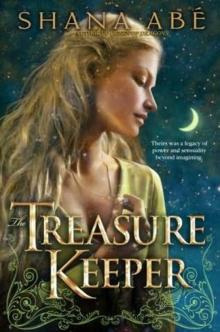 The Treasure Keeper d-4
The Treasure Keeper d-4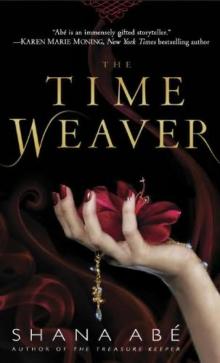 The Time Weaver d-5
The Time Weaver d-5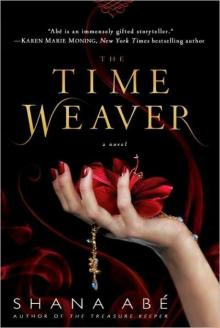 The Time Weaver
The Time Weaver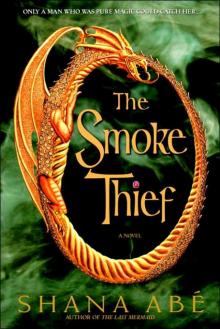 The Smoke Thief
The Smoke Thief The Sweetest Dark
The Sweetest Dark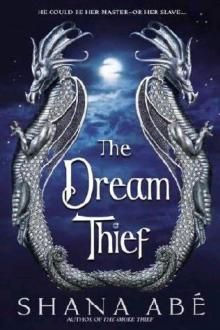 The Dream Thief
The Dream Thief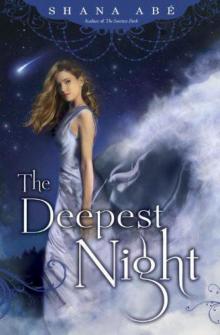 The Deepest Night tsd-2
The Deepest Night tsd-2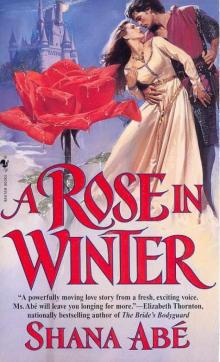 A Rose in Winter
A Rose in Winter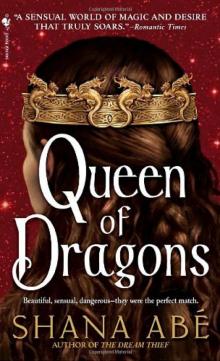 Queen of Dragons d-3
Queen of Dragons d-3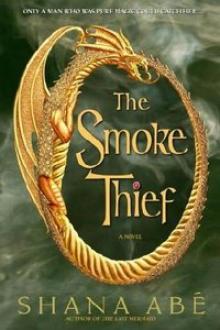 The Smoke Thief d-1
The Smoke Thief d-1